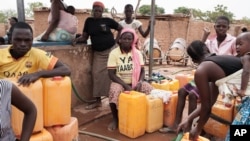ປະມານ 3000 ຄົນຈາກເກືອບ 130 ປະເທດໄດ້ໄປເຕົ້າໂຮມກັນໃນນະຄອນຫຼວງ Stockholm ຂອງປະເທດ Sweden ສຳລັບກອງປະຊຸມສຸດຍອດປະຈຳປີສັບປະດານ້ຳ ຂອງໂລກ ຈາກວັນທີ 28 ສິງຫາ ເຖິງ 2 ກັນຍາ. ຫົວຂໍ້ສຳລັບກອງປະຊຸມປີນີ້ແມ່ນນ້ຳເພື່ອ ການຈະເລີນເຕີບໂຕພໍພຽງ. ນັກຂ່າວ ວີໂອເອ Joe De Capua ມີລາຍງານເພີ່ມເຕີມ, ເຊິ່ງ ພຸດທະສອນ ຈະນຳລາຍລະອຽດມາສະເໜີທ່ານ.
ສະຖາບັນນ້ຳສາກົນ ສຕັອກໂຮມ ກຳລັງເປັນເຈົ້າພາບ ຈັດກອງປະຊຸມສຸດຍອດ, ໂດຍ ເອີ້ນປີ 2016 ວ່າ “ປີທີ່ມີຄວາມຈຳເປັນສຳລັບການກ່າວເຖິງບົດບາດຂອງນ້ຳໃນການ ພັດທະນາ.” ກອງປະຊຸມດັ່ງກ່າວມີຂຶ້ນລຸນຫຼັງການຮັບຮອງເອົາເປົ້າໝາຍການພັດທະນາ ແບບຍືນຍົງຂອງອົງການສະຫະປະຊາຊາດ ຫຼື SDGs ແລະ ຂໍ້ຕົກລົງແຫ່ງປະຫວັດສາດ ຄື ຂໍ້ຕົກລົງດິນຟ້າອາກາດ ປາຣີ.
ທ່ານ Anton Earle ແມ່ນຜູ້ອຳນວຍການຂອງສະຖາບັນສູນກາງພາກພື້ນ ອາຟຣິກາ ທີ່ມີ ຫ້ອງການຕັ້ງຢູ່ເມືອງ Pretoria ປະເທດ ອາຟຣິກາໃຕ້.
ທ່ານ Anton ກ່າວວ່າ “ຄວາມພະຍາຍາມໃດໆ ເພື່ອສົ່ງເສີມການພັດທະນາຈະບໍ່ມີ ຄວາມໝາຍຫຍັງເລີຍ ຖ້າພວກເຮົາບໍ່ສະໜອງນ້ຳທີ່ມີຄວາມຕ້ອງການນັ້ນ. ຂ້າພະເຈົ້າ ໝາຍຄວາມວ່າ ການເຂົ້າຫາການພັດທະນາໃດທກໍຕາມທີ່ທ່ານຈະສາມາດຄິດຫາ, ບໍ່ ວ່າມັນຈະ ເປັນເລື່ອງຮັກສາສຸຂະພາບ, ໃນການສຶກສາ, ໃນການກະສິກຳ ກໍຕາມ.”
ທ່ານໄດ້ອະທິບາຍວ່າເປັນຫຍັງມັນຈຶ່ງຍາກທີ່ຈະໃຫ້ການສຶກສາທີ່ດີແກ່ເດັກນ້ອຍໂດຍ ປາສະຈາກນ້ຳທີ່ສະອາດ.
ທ່ານ Anton ກ່າວວ່າ “ທ່ານມີໂຮງຮຽນຫຼາຍແຫ່ງຖືກສ້າງຂຶ້ນໃນທົ່ວ ອາຟຣິກາ ບ່ອນທີ່ ລັດຖະບານມີຄວາມເຂົ້າໃຈ ກ່ຽວກັບ ວຽກງານການສຶກສາທີ່ຍັງບໍ່ແລ້ວສຳເລັດເທື່ອ. ແລ້ວ ຕໍ່ມາໂຮງຮຽນພວກນີ້ກໍບໍ່ມີນ້ຳ ສະອາດໃຊ້, ແລະ ຍ້ອນວ່າພວກເຂົາເຈົ້າບໍ່ມີນ້ຳ ໃຊ້ທີ່ສະອາດ ຫຼາຍຄັ້ງພວກເຂົ້າເຈົ້າຈຶ່ງບໍ່ມີສຸຂະອະນາໄມທີ່ພຽງພໍຕາມມາດຕະຖານ ທີ່ໄດ້ວາງເອົາ ໄວ້. ຜົນທີ່ອອກມາໂດຍລວມກໍແມ່ນວ່າ ພວກເດັກຍິງກໍຈະບໍ່ໄປໂຮງ ຮຽນກຍ້ອນເຫດຜົນດັ່ງ ກ່າວ."
ເຖິງແມ່ນຈະມີການເຊື່ອມໂຍງກັນຢ່າງແຂງແກ່ນ ລະຫວ່າງ ນ້ຳສະອາດ ກັບ ການພັດທະ ນາ ກໍຕາມ, ມັນກໍໄດ້ເຮັດໃຫ້ບັນຫາບູລິມະສິດນີ້ ໄດ້ຮັບຄວາມຫຍຸ້ງຍາກຢູ່ໃນການເຈລະ ຈາສະພາບອາກາດສາກົນ.
ທ່ານ Anton ກ່າວວ່າ “ຄວາມຈິງແລ້ວ, ສະພາບອາກາດປ່ຽນແປງໄດ້ກໍ່ໃຫ້ເກີດຂຶ້ນ ໂດຍການປ່ຽນແປງຕ່າງໆໃນຊັ້ນບັນຍາກາດຂອງໂລກ. ພວກເຮົາກໍຮູ້ດີຢູ່ວ່າ ການປ່ຽນ ແປງໃນການກໍ່ຕົວຂອງທາດຄາບອນ, ທາດເມທານ, ແກ໊ສເຮືອນແກ້ວອື່ນໆເປັນສິ່ງທີ່ ສົ່ງຜົນກະທົບຕໍ່ບັນຍາກາດຂອງໂລກ. ດັ່ງນັ້ນມັນຈຶ່ງເປັນສິ່ງທີ່ຮູ້ຈັກກັນດີ. ແຕ່ວິທີທີ່ສະ ພາບອາກາດປ່ຽນແປງຈະສົ່ງຜົນກະທົບຕໍ່ໂລກນັ້ນ, ແນ່ນອນ, ຈະຜ່ານການຫຼັ່ງໄຫຼ ຂອງນ້ຳຜ່ານຊັ້ນບັນຍາກາດຂອງໂລກ, ເຮັດໃຫ້ມີການລະເຫີຍເປັນອາຍເພີ່ມຂຶ້ນ, ມີ ການປ່ຽນແປງໃນດ້ານອຸທົກສາດ, ການປ່ຽນແປງໃນຂອງແຫຼວ ທີ່ມັນຈະເກີດຂຶ້ນ."
ເຈົ້າໜ້າທີ່ສະຖາບັນນ້ຳສາກົນ ສຕັອກໂຮມ ກ່າວວ່າ ມັນເປັນເລື້ອງງ່າຍທີ່ຈະສ້າງຕົວຢ່າງ ທຸລະກິດ ສຳລັບອຸດສາຫະກຳພະລັງງານ ແລະ ໂທລະຄົມມະນາຄົມ ຫຼາຍກວ່າສຳລັບນ້ຳ.
ໃນການເຮັດວຽກຢູ່ ອາຟຣິກາ, ທ່ານ Anton Earl ໄດ້ຄົ້ນພົບວ່າທະວີບ ອາຟຣິກາ ມີການ ປ່ຽນແປງສະເພາະຕົວມັນເອງ ໃນການນຳໃຊ້ນ້ຳສຳລັບການພັດທະນາ. ທ່ານກ່າວວ່າມັນ ບໍ່ແມ່ນການເຮັດໃນສິ່ງທີ່ພວກເຂົາເຈົ້າຕ້ອງການທີ່ຈະເຮັດ. ແລະ ນັ້ນແມ່ນການລົງທຶນ ເກືອບ 9 ຕື້ໂດລາຕໍ່ປີ ໃສ່ພື້ນຖານໂຄງລ່າງນ້ຳ. ສິ່ງນີ້ລວມມີ ເຂື່ອນ, ລະບົບນ້ຳໃນເມືອງ, ລະບົບການບຳບັດນ້ຳ ແລະ ສຸຂະອະນາໄມ.
ນອກນັ້ນ ທ່ານຍັງກ່າວອີກວ່າ ຕົວຢ່າງຕ່າງໆໃນຄອມພິວເຕີສະແດງໃຫ້ເຫັນຫຼາຍພາກ ສ່ວນທີ່ໃຫຍ່ຂອງ ອາຟຣິກາ ວ່າຈະເປັນພາກພື້ນທີ່ທີ່ໄດ້ຮັບຜົນກະທົບໜັກສຸດໂດຍສະ ພາບອາກາດປ່ຽນແປງ. ເວົ້າອີກຢ່າງໜຶ່ງກໍແມ່ນວ່າ, ຈະໄດ້ຮັບຜົນກະທົບຈາກໄພແຫ້ງ ແລ້ງ ແລະ ນ້ຳຖ້ວມທີ່ຮ້າຍແຮງກວ່າ ແລະ ຫຼາຍຂຶ້ນອີກກວ່າເກົ່າ.
ເຈົ້າພາບຈັດກອງປະຊຸມສັບປະດານ້ຳຂອງໂລກ ກ່າວວ່າ ກອງປະຊຸມນີ້ ມີເປົ້າໝາຍທີ່ຈະ ສຳໜັບສະໜູນ ການພັດທະນາແບບຍືນຍົງ ຂໍ້ທີ 8, ເຊິ່ງ “ສົ່ງເສີມການເຕີບໂຕແບບຍືນ ຍົງ, ການຂະຫຍາຍຕົວຮອບດ້ານ ແລະ ແບບຍືນຍົງ, ການວ່າຈ້າງງານຢ່າງເຕັມສ່ວນ ແລະ ມີປະສິດທິຜົນ ແລະ ມີວຽກເຮັດງານທຳທີ່ດີສຳລັບທຸກໆຄົນ."
About three-thousand people from nearly 130 countries have gathered in Stockholm for the annual World Water Week summit (8/289/2). This year's theme is Water for Sustainable Growth. VOA's Joe De Capua reports.
The Stockholm International Water Institute is hosting the summit, calling 2016 a "critical year for addressing the role of water in development." The meeting follows the adoption of the U.N. Sustainable Development Goalsthe SDGs -- and the historic Paris climate change agreement.
Anton Earle is director of the institute's Africa regional center based in Pretoria, South Africa.
All other efforts to promote development would really come to nothing if we aren't supplying the water that is needed. I mean any development intervention you can think of, whether it's in health care, in education, in agriculture.
He says explains why it's difficult to provide children with a good education without clean water.
You have schools being built across Africa where governments are really getting to grips with the education backlog. And then these schools not having a secure water supply. And because they don't have a secure water supply they very frequently don't have adequate sanitation. The net result is that especially girls not going to school because of this.
Despite the strong link between clean water and development, making the issue a priority at international climate talks has been difficult.
Essentially, climate change is all caused by changes in the atmosphere of the planet. We know that. You know, changes in the makeup of carbon, methane, other greenhouse gases that are impacting the atmosphere. So that's well known. But the way that climate change will impact the world will, of course, be through waterthe flow of water through the atmosphere, the increase in evaporation, the changes in hydrology, changes in runoff that will occur.
The Stockholm International Water Institute official says it's easier to create business models for the energy and telecommunication industries than it is for water.
Water is different. You know, water's got this connotation of being a human right. As soon as you start moving too strongly towards private sector engagement -- and the implication that a private company might make a profit from supplying waterit becomes very politically contentious. There's no easy answer to this and you always have to be looking at the issues around access and equity. So that could be part of the problem.
Working in Africa, Earle has found the continent has its own particular challenges in using water for development. He says it's not doing what it needs to do. And that is invest about nine billion dollars a year in water infrastructure. This includes dams, urban water systems, water treatment and sanitation systems.
He also says computer models show large parts of Africa will be among the hardest hit by climate change. In other words, more frequent and more severe droughts and floods.
World Water Week organizers say the meeting aims to support SDG number 8, which is to "promote sustained, inclusive and sustainable growth, full and productive employment and decent work for all."










